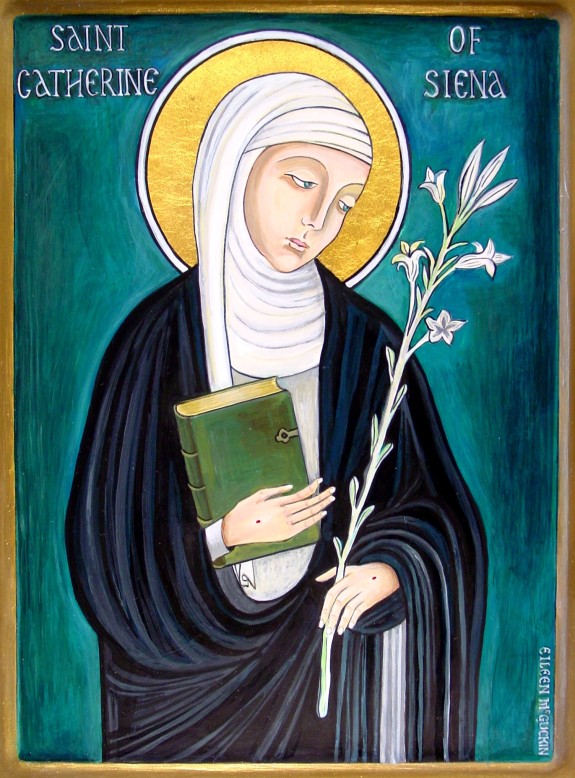Today we continue our regular series called “Learning from the Saints.” Our guide is expert Bert Ghezzi, a dear friend of mine and the author of numerous books including Voices of the Saints, Saints at Heart, and Discover Christ: Developing a Personal Relationship with Jesus.
His newest book is The Saints Devotional Bible, which illuminates the Scriptures with the saints’ own reflections. You can learn more about Bert and his work at BertGhezzi.com.
Today, Bert profiles St. Catherine of Siena, one of the great Doctors of the Church.
“Offer your bodies as a living sacrifice, dedicated and acceptable to God.”
— Romans 12:1
St. Catherine of Siena was a peacemaker. By prayer and personal diplomacy, she labored to make peace between popes and Italian city states. On her knees and with her letters, she sought peace for the Church by influencing the pope to return from Avignon to Rome.
Most of all, Catherine sacrificed herself for the peace of souls. The following passage from her Dialogue epitomizes her life. God is responding to her offer to suffer for others:
“The sufferings you endure will, through the power of charity, suffice to win both atonement and reward for you and for others. For you they will win the fruit of life. The stains of your foolishness will be blotted out, and I will no longer remember that you had ever offended me. As for others, because of your loving charity, I will pardon them in proportion to their receptiveness.
“The willing desire to suffer every pain and hardship even to the point of death for the salvation of souls is very pleasing to me. The more you bear, the more you show your love for me. In loving me you come to know more of my truth, and the more you know, the more intolerable pain and sorrow you will feel when I am offended.
“You asked for suffering, and you asked me to punish you for the sins of others. You were, in effect, asking for love and light and knowledge of the truth. For suffering and sorrow increase in proportion to love: When love grows, so does sorrow. Patience is not proved except in suffering, and patience is one with charity. Endure courageously, then. Otherwise you will not show yourselves to be–nor will you be—faithful spouses and children of my Truth, nor will you show that your delight is in my honor and in the salvation of souls.”
 Catherine gathered a band of disciples who served Siena’s poor and lived in poverty themselves. Daily the saint begged and baked bread to feed the hungry, but her real concern was for hungry souls. Catherine evangelized the whole town. No one escaped her attention. Through her intercession belligerent inmates in the jails repented. She even confronted local crime bosses causing them to abandon their plots and transforming their lives. It is said that she kept three priests busy with the confessions and pastoral care of her penitents.
Catherine gathered a band of disciples who served Siena’s poor and lived in poverty themselves. Daily the saint begged and baked bread to feed the hungry, but her real concern was for hungry souls. Catherine evangelized the whole town. No one escaped her attention. Through her intercession belligerent inmates in the jails repented. She even confronted local crime bosses causing them to abandon their plots and transforming their lives. It is said that she kept three priests busy with the confessions and pastoral care of her penitents.
For most of the fourteenth century, the popes resided in Avignon, France, kept there by politics and civil strife. In 1376, Catherine visited Gregory XI and helped him decide to return to Rome. Two years later, however, a schism divided the Church when two men claimed to be pope, one at Rome and another at Avignon.
This scandal wore heavily on Catherine. Urban VI required her to advise him in Rome, and she exhausted herself with prayer and advocacy on his behalf. In 1380, her health deteriorated rapidly, and she could not eat or drink water. She had a vision of the Church as a great ship that was crushing her. And she offered her suffering as a living sacrifice for the sake of the Church. On April 29, she died of a stroke.
“I have placed you in the midst of your fellows that you may do to them what you cannot do to me, that is to say that you may love your neighbor freely without expecting any return from him, and what you do to him I count as done to me.”
— St. Catherine of Siena
(Image Credit: Sophia Institute)
Read more from Bert at his website www.BertGhezzi.com, or check out his many books on Amazon.
 |
 |
 |
 |


